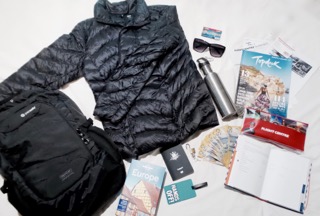
Olivia Walker gives her top tips for an overseas exchange
The second in our National Youth Week 2016 blog series, where young people in our programs provide an insight into some of their amazing experiences.
The prospect of heading to a foreign country to undertake university studies is pretty daunting. Although the term visa may have you shying away from the idea, heading overseas on exchange is both a great way to build up your interpersonal skills and allow you to experience culture thus making you a more-well rounded person. Think exchange is something you might be interested in? Here are my top 10 tips to consider:
1. Destination
The biggest and most challenging thing people have trouble with is deciding where they want to go. Therefore, my number one tip is to thoroughly research the places you would like to travel to. In light of recent events, some areas are deemed unsafe to travel and having an understanding of these places is crucial. Also, think about what degree you are studying and what you plan on doing in the future. There may be certain destinations that seem on par with the future you. However, I always recommend choosing destinations that appeal to you as well as your career. Then hop on the Google machine and explore, if you can picture yourself there, then that’s the go.
2. Cultural Awareness
I cannot stress enough the importance of knowing before going! Firstly, it is super important to check if there are any vaccinations that are required entering that country. This brings me to my next point, ensure you have a good understanding of the medical system and health insurance policy as well as knowing the emergency contact number for your host country. Dialing 000 will do you no good in Costa Rica. Secondly, brush up on basic laws so that you don’t go around committing offences because, lets face it, being fined for chewing gum in Singapore is probably not the best way to start off a trip. In terms of cultural norms, doing your research and perhaps investing in a Lonely Planet travel guide for your host country will be the best way to go about. It is also important to consider behavior when overseas as certain hand gestures may be misinterpreted and could be offensive. Weather is another factor to consider. Down under we can get a variety do seasons in one day, but this tends to be a Melbourne special and therefore you should be thoroughly aware of what season you will be entering into and pack accordingly. If you are heading during winter it may be necessary for you to purchase snow boots, thermal gear, gloves, scarves and feather down goods to keep you warm. In warmer weather, comfortable clothing and plenty of sunscreen take precedent.
3. Language
Some people think that not speaking the language of the country you are entering is the be all and the end all. Wrong! Reading this blog means you are already gifted with the English language and pretty much anywhere in the world you will find the locals will have an English counter part. English is the worlds most spoken language and so getting around won’t be a big issue because after all. However, it may be handy to take up a language class before you jet set, that way you will feel more comfortable communicating and you will be able to add the talent of speaking another language, even if very minimal, onto the resume. Added bonus! For those of you who can only speak the native mother tongue there are many international universities that offer English courses. You will have the benefit of submerging yourself into another culture, without the struggles of leaning how to read, write and speak in another language. Sometimes your host university will have a language course you can take during o-week so that you understand the basics. For those that can speak another language why not boost your skills further and test your abilities by taking up a semester in that country. You will become even more fluent and more culturally diverse.
4. Safety
It may seem a bit controversial but when a lovely old lady at an international airport asks you to carry her bags think twice. When travelling anywhere it doesn’t harm to take extra precautions. Little things like where to hide money and securing a passport are just small considerations that can eliminate fraud and spending unnecessary money. Investing in things like Pacsafe gear with RFID technology that protects your cards and passports will set your mind at ease. There are also secure sock pouches where money can be stashed on your person to prevent theft. Also, taking out proper insurance for the duration or your stay is important. Make sure you take a thorough look at the policy and ask questions when you meet your flight agent. Lost luggage is very common so ensuing you are covered in an event where your luggage is lost is crucial. Another optional addition, just to be extra safe, is to carry an emergency contact card around with. This will be super important if injury was to occur to you. It is also important to keep a copy of the contact number and address of the closest embassy, this way if you encounter any problems along the way you can ring them immediately. This will be both comforting and super useful in times of need.

5. Budget
Ok so we understand that heading to Milan on exchange is a bit of a fairy tail unless we have some support. Financial support that is! If you are anything like me having one scoop of gelati whilst in the middle of Rome isn’t quite going to cut it and so budgeting is very important. Depending on whether you undertake the exchange program through your university or not, the university may allocate certain amount of funds to go towards your trip. Where this isn’t the case and for extras like accommodation and basic living it’s important to start saving immediately. No one can be exactly certain on how much you would need but generally speaking allow up to 200 AUD a week. So for a basic semester exchange that works out to be at least $2,400. But don’t stress, by putting away $150 a week for 6 months you will be able to save over $3,500. Not bad after all!
6. Destination
Now, to live on the more lavish side of things always be on the look out for scholarships! Most university’s will have scholarships specifically for exchange but also look into any other scholarships that may apply. Broaden the network a bit and have a look at the local government and commonwealth government websites too. As Australia is very multicultural and like to promote international affairs, you may be able to receive special funding for your destination. The world is your oyster and with a scholarship under your belt, all the oysters will be yours.
7. Paperwork
Heading on exchange is very exciting and will provide you with the ultimate trip of a lifetime but this all comes with lots and lots of preparation. Most exchanges are semester durations and depending on which country you end up in this can be as long as 6 months. This means you will need to apply for a visa in order to stay over there. Visa applications can be made via the consulate or embassy of that country. Alternatively, you can head online to the country’s government website and lodge the application online with all the required documents and then send it straight to the countries representatives in Australia. Visas can be a little costly and take a fair bit of work so make sure to get started on this early. Passport applications can also take a few months and it is important to consider this when applying. There are also applications that will need to be made to the host university which will take time. Always start as soon as you possibly can to minimise the risk of planning a trip without having the physical passport.
8. Technicalities
It goes without saying that exchange will be a little slice of heaven and during your time away you will need to establish a home away from home. This includes pretty much everything you use in Australia being reformed in your new home country. Things including phone plans, bank accounts, internet and housing all need to be arranged. Most phone carriers here will charge large fees for roaming whilst overseas and thus it is must more cost effective to open up a new plan with an overseas supplier. We are all going to need some dollar whilst overseas and taking into consideration the exchange rate and withdrawal fees it might be worthwhile looking at opening up a bank account with a bank in your host country. Generally you will be able to find a branch in Melbourne where you discuss opening up an account prior to leaving. Accommodation can sometimes be arranged by the host university however in instances where it is not, look at university dormitories and student villages near by. Locking in a spot is a lot of back and forth communication and starting on this early is paramount.

9. Seeing the world
While it may seem like you are living the high life whilst overseas in the back of your mind you have to remind yourselves that this is still a semester at university. That means there are still lectures, tutorials, assignments and exams to be completed. So while it would seem ideal to travel every movement you are on exchange practically speaking this may not always work. I would consider planning a trip before (or after) your semester begins. This will allow you to have the best fun away, gain a bit of cultural insight and grasp an idea as to what it is like living in your host country. Plan some time to get to known the area you will be living in and the university too. Once you have had your culture injection you will then be able to start uni all refreshed and ready to go. Bear in mind that there are semester breaks and long weekends so when you are ahead with your homework (or lets face it, just up to date) that you can jump on a bus and become a tourist!
10. Life on your own
This both the exciting part and the nerve racking part. Planning exchange is an independent task and rarely people head on exchange with their friends. But this doesn’t particularity mean you will be sitting alone in your dormitory on Saturday nights, in fact it probably means the opposite! There are great clubs and international communities to get involved in. You will meet so many new people and chances are, there will be others in the exact same situation as you. If you travel before hand you may even make friends that you can meet with during your time overseas. Not to mention with Facebook and Skye you will be able to stay connected to everyone who remains down under. You can make new friends and still keep in touch with your old friends, so its really a win win situation.
